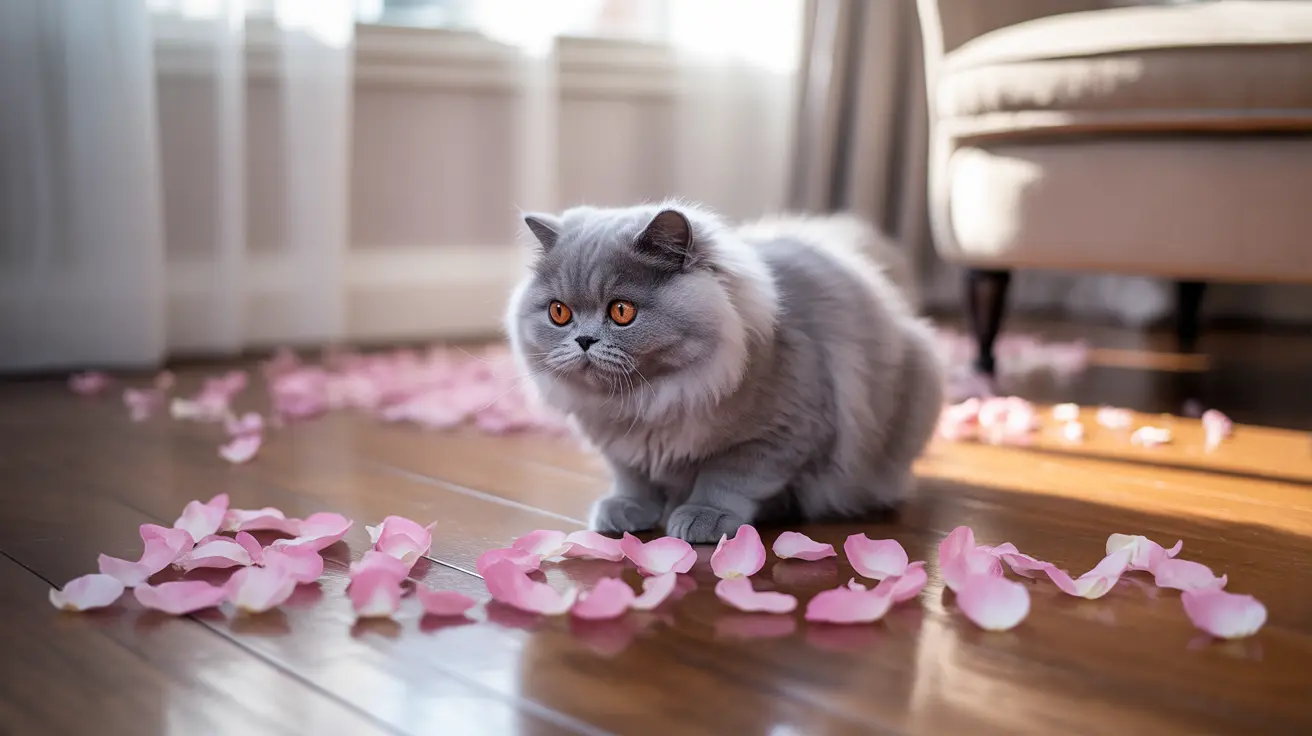The Safety of True Roses for Cats
True roses from the genus Rosa are not poisonous to cats according to the ASPCA. This includes the petals, leaves, and stems of the plant. However, just because something isn't toxic doesn't mean it's completely safe for consumption.
Cats are obligate carnivores, which means their digestive systems are designed primarily for processing meat. When they eat plant material like rose petals, they may experience mild digestive upset, including:
- Temporary stomach discomfort
- Mild vomiting
- Loose stools
- Loss of appetite
Hidden Dangers Beyond Toxicity
The Thorn Problem
Perhaps the most obvious danger comes from rose thorns. These sharp protrusions can cause serious injuries to your cat's:
- Mouth and tongue
- Paws and paw pads
- Face and eyes
- Digestive tract if swallowed
Chemical Concerns
Store-bought roses and garden specimens are often treated with various chemicals, including:
- Pesticides
- Fungicides
- Preservatives
- Fertilizers
These substances can be toxic to cats if ingested, even in small amounts. Always assume that store-bought roses have been treated with chemicals unless specifically labeled otherwise.
Look-Alike Plants to Avoid
While true roses are non-toxic, several plants with "rose" in their names are actually dangerous for cats. Watch out for:
- Desert Rose (Adenium obesum)
- Christmas Rose (Helleborus niger)
- Rose of Sharon (Hibiscus syriacus)
- Primrose (Primula species)
These plants can cause severe toxicity symptoms and require immediate veterinary attention if ingested.
Prevention and Safety Measures
To keep your cat safe around roses:
- Remove thorns before bringing roses indoors
- Keep bouquets out of your cat's reach
- Choose organic, chemical-free roses when possible
- Monitor your cat around any new plants
- Consider cat-safe alternatives like cat grass or catnip
Frequently Asked Questions
Can cats safely eat rose petals without getting sick?
While true rose petals aren't toxic, they can cause mild digestive upset if eaten. It's best to prevent your cat from eating them, even though small amounts typically won't cause serious harm.
What symptoms should I watch for if my cat eats rose petals or stems?
Watch for vomiting, diarrhea, loss of appetite, or unusual lethargy. If your cat shows severe symptoms or symptoms persist beyond 24 hours, contact your veterinarian.
Are rose thorns dangerous to cats, and how can I prevent injuries?
Yes, rose thorns can cause serious injuries. Remove thorns before bringing roses inside, or keep roses in areas your cat can't access. If you notice bleeding, pawing at the mouth, or excessive drooling, check for thorn injuries.
Can pesticides on roses harm my cat if they nibble on the flowers?
Yes, pesticides and other chemicals on roses can be toxic to cats. Always assume store-bought roses have been treated with chemicals. Choose organic roses or keep treated flowers completely out of your cat's reach.
How do I tell the difference between safe roses and toxic "rose" plants for cats?
True roses (Rosa species) are safe, while plants with "rose" in their common names may be toxic. Check the botanical name before purchasing, and consult the ASPCA's toxic plant database when in doubt.
Conclusion
While true roses aren't toxic to cats, it's best to err on the side of caution and keep them away from your curious feline. Between thorns, chemicals, and potential digestive issues, the safest approach is to either keep roses out of reach or opt for cat-safe alternatives. If you suspect your cat has eaten roses or shows concerning symptoms, don't hesitate to contact your veterinarian for guidance.






